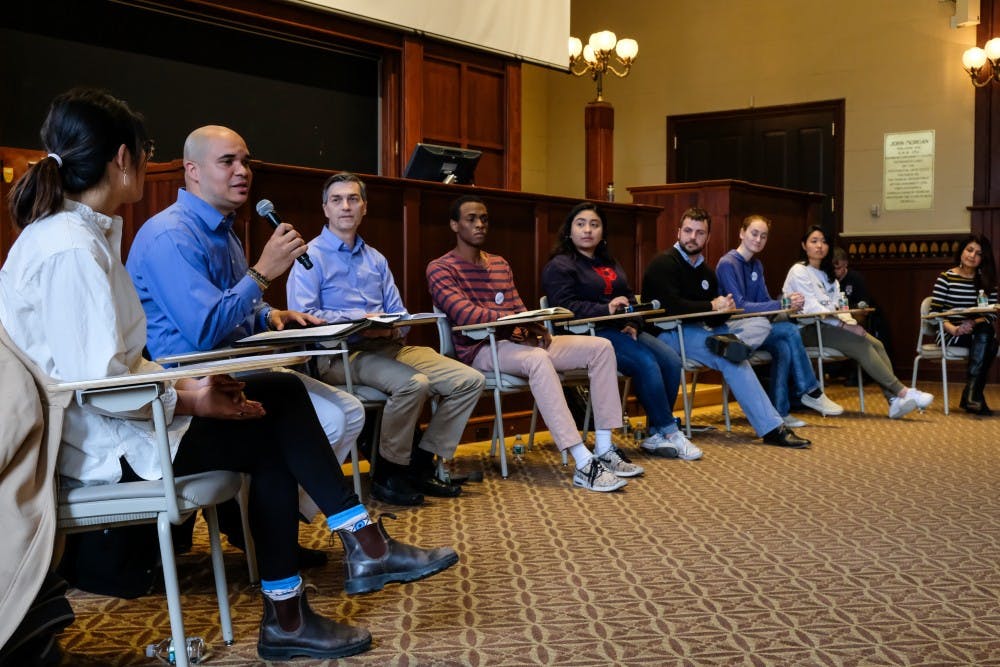Penn’s second-ever “Campus Conversation” — an event intended to cultivate community resilience amidst mental health and wellness issues on campus — took place Monday evening as the kick-off to the 2018 Mental Wellness Week.
Completely student-led, this event had even less administrative participation than its first iteration, which drew criticism when attendees reportedly left frustrated that the "conversation" omitted any concrete announcement of policy change from Penn's administration.
Yet despite being organized by Penn Wellness, the umbrella group for Penn's mental health student organizations, very few students were present in the audience.
While the first Campus Conversation yielded hundreds of attendees, there were only about 100 people at Monday's event. And despite the increased student representation on stage, fewer than half of the event's attendees were students.
The idea to have this Campus Conversation include more students and fewer administrators, Associate Vice Provost for Student Affairs Hikaru Kozuma said, came from Penn Wellness student leaders, who said they wanted to include the student voices that were absent during the first conversation.
Consequently, Monday's panel comprised five undergraduate and graduate panelists, two faculty panelists, one student moderator, and one faculty moderator. College senior Serena Bian and University Chaplain Reverend Charles L. Howard shared the stage as co-moderators.

At the first Campus Conversation, Penn President Amy Gutmann and Provost Wendell Pritchett took center stage while Undergraduate Assembly President and College senior Michelle Xu moderated the event. On Monday, however, Pritchett sat in the first row as an audience member, and Gutmann was not present.
RELATED:
At the 'Campus Conversation,' administrators shared personal stories, but no policy solutions
Penn promised more wellness events after the 'Campus Conversation.' Here's what has been done.
What Penn's wellness portal got right and what has to change, according to student leaders
Wharton senior and Campus Conversation panelist Phillip Isom said that he wasn’t surprised by the lower turnout.
“You definitely are going to get a lot more people who are upset about a situation and are willing to take action on it in that first wave," Isom said.
"And then to get the continued action is what's the difficult part,” he continued, adding that the lack of student attendance at Monday's event should act as a fuel to make conversations about mental health more of a priority.

The conversation itself covered a wide variety of issues centering on mental wellness, including the lack of mental health resources for graduate students of color, the failure to execute policy changes, and the way professors can promote mental wellness within their classrooms.
“We hoped that more people would come,” College senior and Campus Conversation panelist Kathryn Dewitt said. “But it's not always about the numbers — it's about the quality of discussion and whether or not the message is really reaching each person.”
Nursing sophomore and Associate Member of the UA Jessica Andrews and Wharton senior and UA Treasurer Samantha Shea said that they were frustrated with the low student turnout in light of how big of a topic mental health has become at Penn.
“If you complain about situations, you need to take action to help facilitate the change today,” Shea said.

A student member of the audience also shared the sentiment. Brian Chao stood up from his seat during the Q&A session and said, "It's heartbreaking to see a lot of people just not wanting to make this as much of a priority."
College sophomore and Campus Conversation panelist Rylee Park said that Penn’s decentralized nature results in the creation of plans that rarely come to fruition.
“I think a way to solve that is accountability,” she said. “If there is more accountability between the students and administrators, I think all the great conversations that we have can lead to even better outcomes, better results, a better community at Penn.”
Students also took issue with the schedule of the event. The first Campus Conversation contained both a panel discussion and smaller breakout discussions, and while Monday's initial format was supposed to be the same, the panel ran late, preventing the breakout sessions from happening.
Shea found that during the first Campus Conversation, the breakout sessions were “the most impactful thing that we did” and was disappointed that they weren’t included in the second session, especially since top administrators were not included on the panel.
This event comes almost five months after the first Campus Conversation, which Penn's administrators initiated last October after the Las Vegas mass shooting, and the ongoing uncertainty faced by students involved in the Deferred Action for Childhood Arrivals program.

The first event followed a series of student deaths in the fall semester — College senior Nicholas Moya, Penn Vet student Brett Cooper, Wharton senior Henry Rogers, and Penn Law student Justin Hamano. Similarly, the second Campus Conversation came after a string of tragedies as well.
On Dec. 31, College freshman William Steinberg died in a plane accident with his family, becoming the eighth Penn student to die in 2017. Soon after, campus was struck by the news of the disappearance and subsequent death of College sophomore Blaze Bernstein, which was later ruled a homicide. Less than a week after Bernstein was found dead in Orange County, Calif., a first-year Penn Law student, Jonathan Lumpkin, died in his apartment in Sansom Place East. Most recently, Penn Engineering employee Benjamin Francis Rivell, 28, died from an "accidental drug overdose” on March 20.
“I think in order to change things, we need to listen,” Dewitt said. “But we also need to speak back and that's why it's a campus conversation. It's not just one direction — it's listening and then responding.”
"Campus Conversation" is a part of the University’s Campaign for Community, a project launched in April 2015 by former Provost Vincent Price that “aims to strengthen our Penn community by finding ways to discuss and understand key issues that may appear to be difficult or intractable."



